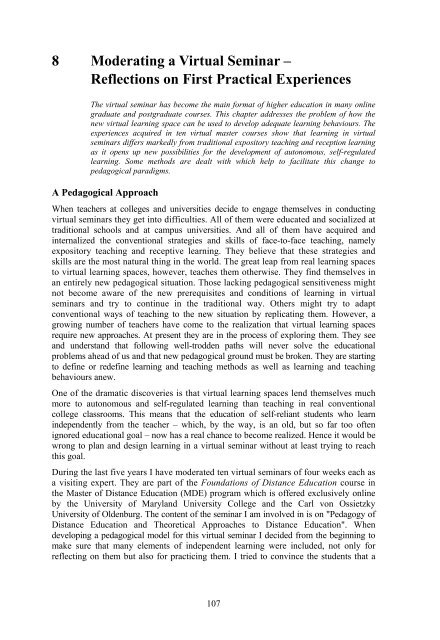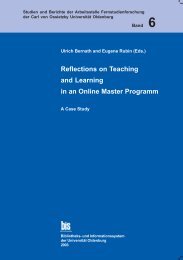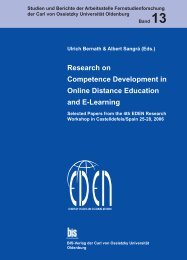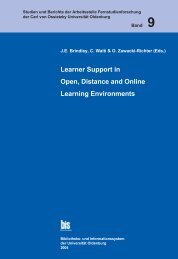Distance Education in Transition - Master of Distance Education ...
Distance Education in Transition - Master of Distance Education ...
Distance Education in Transition - Master of Distance Education ...
You also want an ePaper? Increase the reach of your titles
YUMPU automatically turns print PDFs into web optimized ePapers that Google loves.
8 Moderat<strong>in</strong>g a Virtual Sem<strong>in</strong>ar –<br />
Reflections on First Practical Experiences<br />
The virtual sem<strong>in</strong>ar has become the ma<strong>in</strong> format <strong>of</strong> higher education <strong>in</strong> many onl<strong>in</strong>e<br />
graduate and postgraduate courses. This chapter addresses the problem <strong>of</strong> how the<br />
new virtual learn<strong>in</strong>g space can be used to develop adequate learn<strong>in</strong>g behaviours. The<br />
experiences acquired <strong>in</strong> ten virtual master courses show that learn<strong>in</strong>g <strong>in</strong> virtual<br />
sem<strong>in</strong>ars differs markedly from traditional expository teach<strong>in</strong>g and reception learn<strong>in</strong>g<br />
as it opens up new possibilities for the development <strong>of</strong> autonomous, self-regulated<br />
learn<strong>in</strong>g. Some methods are dealt with which help to facilitate this change to<br />
pedagogical paradigms.<br />
A Pedagogical Approach<br />
When teachers at colleges and universities decide to engage themselves <strong>in</strong> conduct<strong>in</strong>g<br />
virtual sem<strong>in</strong>ars they get <strong>in</strong>to difficulties. All <strong>of</strong> them were educated and socialized at<br />
traditional schools and at campus universities. And all <strong>of</strong> them have acquired and<br />
<strong>in</strong>ternalized the conventional strategies and skills <strong>of</strong> face-to-face teach<strong>in</strong>g, namely<br />
expository teach<strong>in</strong>g and receptive learn<strong>in</strong>g. They believe that these strategies and<br />
skills are the most natural th<strong>in</strong>g <strong>in</strong> the world. The great leap from real learn<strong>in</strong>g spaces<br />
to virtual learn<strong>in</strong>g spaces, however, teaches them otherwise. They f<strong>in</strong>d themselves <strong>in</strong><br />
an entirely new pedagogical situation. Those lack<strong>in</strong>g pedagogical sensitiveness might<br />
not become aware <strong>of</strong> the new prerequisites and conditions <strong>of</strong> learn<strong>in</strong>g <strong>in</strong> virtual<br />
sem<strong>in</strong>ars and try to cont<strong>in</strong>ue <strong>in</strong> the traditional way. Others might try to adapt<br />
conventional ways <strong>of</strong> teach<strong>in</strong>g to the new situation by replicat<strong>in</strong>g them. However, a<br />
grow<strong>in</strong>g number <strong>of</strong> teachers have come to the realization that virtual learn<strong>in</strong>g spaces<br />
require new approaches. At present they are <strong>in</strong> the process <strong>of</strong> explor<strong>in</strong>g them. They see<br />
and understand that follow<strong>in</strong>g well-trodden paths will never solve the educational<br />
problems ahead <strong>of</strong> us and that new pedagogical ground must be broken. They are start<strong>in</strong>g<br />
to def<strong>in</strong>e or redef<strong>in</strong>e learn<strong>in</strong>g and teach<strong>in</strong>g methods as well as learn<strong>in</strong>g and teach<strong>in</strong>g<br />
behaviours anew.<br />
One <strong>of</strong> the dramatic discoveries is that virtual learn<strong>in</strong>g spaces lend themselves much<br />
more to autonomous and self-regulated learn<strong>in</strong>g than teach<strong>in</strong>g <strong>in</strong> real conventional<br />
college classrooms. This means that the education <strong>of</strong> self-reliant students who learn<br />
<strong>in</strong>dependently from the teacher – which, by the way, is an old, but so far too <strong>of</strong>ten<br />
ignored educational goal – now has a real chance to become realized. Hence it would be<br />
wrong to plan and design learn<strong>in</strong>g <strong>in</strong> a virtual sem<strong>in</strong>ar without at least try<strong>in</strong>g to reach<br />
this goal.<br />
Dur<strong>in</strong>g the last five years I have moderated ten virtual sem<strong>in</strong>ars <strong>of</strong> four weeks each as<br />
a visit<strong>in</strong>g expert. They are part <strong>of</strong> the Foundations <strong>of</strong> <strong>Distance</strong> <strong>Education</strong> course <strong>in</strong><br />
the <strong>Master</strong> <strong>of</strong> <strong>Distance</strong> <strong>Education</strong> (MDE) program which is <strong>of</strong>fered exclusively onl<strong>in</strong>e<br />
by the University <strong>of</strong> Maryland University College and the Carl von Ossietzky<br />
University <strong>of</strong> Oldenburg. The content <strong>of</strong> the sem<strong>in</strong>ar I am <strong>in</strong>volved <strong>in</strong> is on "Pedagogy <strong>of</strong><br />
<strong>Distance</strong> <strong>Education</strong> and Theoretical Approaches to <strong>Distance</strong> <strong>Education</strong>". When<br />
develop<strong>in</strong>g a pedagogical model for this virtual sem<strong>in</strong>ar I decided from the beg<strong>in</strong>n<strong>in</strong>g to<br />
make sure that many elements <strong>of</strong> <strong>in</strong>dependent learn<strong>in</strong>g were <strong>in</strong>cluded, not only for<br />
reflect<strong>in</strong>g on them but also for practic<strong>in</strong>g them. I tried to conv<strong>in</strong>ce the students that a<br />
107





